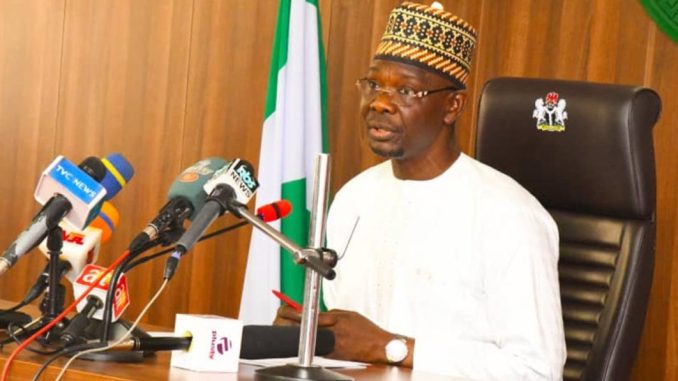
Nasarawa State Governor Abdullahi Sule has revealed that approximately 80 percent of the illegally recruited secondary school teachers in the state are unable to write an acceptance letter.
He made this statement during a meeting with a coalition of Christian denominations under the Christian Association of Nigeria (CAN) at the Government House.
Governor Sule firmly rejected the request made by CAN’s Nasarawa State Chairman, the Very Reverend Dr. Sunday Emma, to absorb the illegally recruited teachers, emphasizing that most of them lacked the necessary qualifications for teaching.
“You are asking me to absorb them. Reverend, look at it two ways. I am not saying that I want to cause some people problems. I was told some of these people who paid money are not even qualified to teach. I was told some of them have given as much as 700, 600 thousand naira. These are people who would be paid less than 100,000. I was told 80 percent of them could not even write acceptance letters. If you are the Governor Sir, and you are being told all these. If we are helping them, we are not helping our educational system. That means we can completely forget about our desire to reform the educational system,” he said.
The governor explained that upon assuming office in 2019, he commissioned education experts to conduct a baseline survey of schools across the state. The report highlighted the deplorable condition of the educational sector and the urgent need for qualified teachers among other reforms.
“They came back and said they needed buildings, we have done that, they needed curriculum, we have done that, amongst others. They also said we needed teachers. They said let us start with 1000 teachers. So we approved the employment of 1000 teachers,” he stated.
However, Governor Sule disclosed that the Teachers’ Service Commission (TSC), which he recently suspended, had exceeded the approved number by employing over 1000 additional teachers without authorization.
“They brought to me among the 1000, 50 slots because they know there are a lot of people that would approach me to ask for slots. I said no, don’t give me any fifty. Go ahead and employ all of them based on merit. I don’t even have a single slot. The reason is that our educational system in the state is grossly decayed and we need to bring it up. If we don’t have qualified teachers if we employ teachers based on this-one-knows-this-one, we may not have the kind of good teachers that we are looking for,” he said.
Governor Sule also criticized the reluctance of many of the recruited teachers to work in rural areas, choosing instead to remain in urban centers.
“You cannot bring people who cannot teach, who will refuse to go to the villages where we need teachers, choosing to remain in the cities. They have to remain in Lafia, Akwanga, Keffi, Karu. Some of them don’t even want to go to Toto to talk less of Gudi. These are the problems we are facing.”
He stressed the importance of maintaining educational standards and ensuring that only qualified teachers are employed, stating, “I don’t want you to feel that you have pleaded with me, and I have refused to help. In reality, I don’t have any problem helping whomever, but I don’t want to bastardize our education system.”
The governor announced plans to hold a fresh interview process for all the recruited teachers, including the initially approved 1000, to ensure that only the most qualified candidates would be retained.
“Let our selection of competent teachers come from there so that they can be given equal opportunity. This time around, we will not allow these types of people to engage them. We cannot get it right if we fail to do the right thing. My dream is to get it right in Nasarawa State. That is the dream of my colleague. But we can’t get it right except if we are honest to ourselves,” he concluded.

Very good and interesting